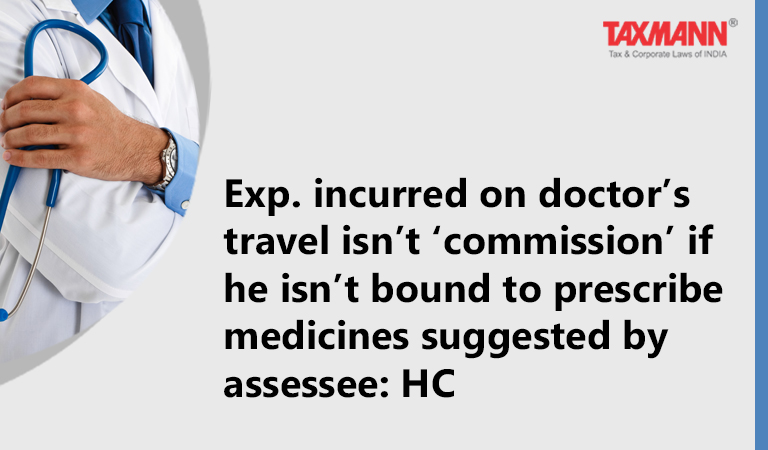Exp. incurred on doctor’s travel isn’t ‘commission’ if he isn’t bound to prescribe medicines suggested by assessee: HC
- Blog|News|Income Tax|
- 2 Min Read
- By Taxmann
- |
- Last Updated on 31 August, 2021

Case details: CIT (TDS) v. Intas Pharmaceuticals Ltd. - [2021] 129 taxmann.com 347 (Gujarat)
Judiciary and Counsel Details
-
- Ms. Bela M. Trivedi and Dr. Ashok Kumar C. Joshi, JJ.
- M.R. Bhatt, Sr. Counsel and Mauna M. Bhatt for the Appellant.
- B.S. Soparkar, Adv. for the Respondent.
Facts of the Case
Assessee was a company engaged in the business of manufacturing and trading pharmaceuticals. During the survey carried out at assessee’s premises, various E-mails were found, suggesting that the services provided to the doctors such as taxi services, booking of air-tickets, cost of souvenir and cost of registration for the conference for doctors, etc., and certain facilities provided to the doctors were in lieu of business provided by them. Assessee claimed a deduction for these expenses under various heads as its own expenses, and no TDS was deducted. Assessing Officer (AO) took cognizance of the Notification issued by the Indian Medical Counsel dated 10-12-2009, which barred medical practitioners from taking gifts, travel facilities, hospitality, cash, and monitory grants from any pharmaceutical industry. He observed that assessee had incurred the expenditure on the doctors for various conferences/workshops/camps etc., for which no TDS was deducted under section 194H.
AO believed that the relationship between assessee and the doctors was that of the principal and agent. Therefore, the payments made under different heads for a regional conference, scientific conference, sale promotion expenditure, etc., would fall within the definition of “commission”. AO, therefore, treated assessee as an assessee in default under Section 201(1) for non-deduction of TDS under Section 194H and raised the demand.
High Court Held
On appeal, Gujrat High Court held that the doctors were not bound to prescribe the medicines as suggested by assessee. As such, there was no legal compulsion on the part of the doctors to prescribe a particular medicine suggested by assessee, and therefore, the doctors could not be said to have acted as the agent of assessee. In the absence of the element of agency between assessee and the doctors, the provisions contained in Section 194H could not be invoked.
Disclaimer: The content/information published on the website is only for general information of the user and shall not be construed as legal advice. While the Taxmann has exercised reasonable efforts to ensure the veracity of information/content published, Taxmann shall be under no liability in any manner whatsoever for incorrect information, if any.

Taxmann Publications has a dedicated in-house Research & Editorial Team. This team consists of a team of Chartered Accountants, Company Secretaries, and Lawyers. This team works under the guidance and supervision of editor-in-chief Mr Rakesh Bhargava.
The Research and Editorial Team is responsible for developing reliable and accurate content for the readers. The team follows the six-sigma approach to achieve the benchmark of zero error in its publications and research platforms. The team ensures that the following publication guidelines are thoroughly followed while developing the content:
- The statutory material is obtained only from the authorized and reliable sources
- All the latest developments in the judicial and legislative fields are covered
- Prepare the analytical write-ups on current, controversial, and important issues to help the readers to understand the concept and its implications
- Every content published by Taxmann is complete, accurate and lucid
- All evidence-based statements are supported with proper reference to Section, Circular No., Notification No. or citations
- The golden rules of grammar, style and consistency are thoroughly followed
- Font and size that’s easy to read and remain consistent across all imprint and digital publications are applied



 CA | CS | CMA
CA | CS | CMA
